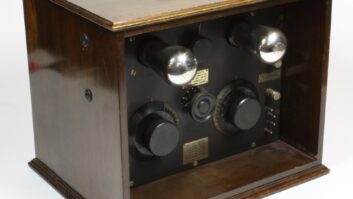Book Looks at Radio’s Underused Ability to Educate, Organize People of Poorest Nations
Education sounds boring to Americans, but it is not boring to tens of millions of kids around the world who cannot go to school, and whose only route out of poverty is learning to read, write and do basic math, lessons which radio has taught successfully in thousands of understaffed schools and at home.
Radio is not boring to young men and women who have no jobs and no hope, and to whom the West seems like both a dream and a nightmare. The war in Iraq, continuing natural disasters and the fear of a flu pandemic make imperative the need to communicate to diverse local cultures honestly, persuasively and with sensitivity. Information about these problems in a credible and understandable voice can make a difference. Radio is the only voice that truly spans the distance between rural villages and commuters’ cars.
“Radio: A Post Nine-Eleven Strategy for Reaching the World’s Poor” underscores how radio is more powerful than ever in promoting positive social change around the world. Stephen Sposato and I accuse radio programming of falling prey to Western advertising and marketing models, which stress entertainment over education.
The tie that binds
Of all the world’s media, radio is still the only one that speaks consistently, night and day, from city to remote village. “Radio” is a labor of love and respect for the medium, particularly radio in developing nations of villages and crowded cities; and of wealth, talent, poverty and educational inequality – nations with emerging democracies and terrible injustices. This is a world where radio and its ability to reach, teach, advocate and inform are vital to future human development.
The book is a series of stories about radio success in Africa, India and Latin America; and earlier, in post WWII Great Britain. It also is the story of the remarkable changes in U.S. government broadcasting, such as the VOA, Radio Sawa and other USG radio. Use has expanded dramatically since 9/11.
The stories exemplify radio’s power – today and yesterday – to organize people to make a difference in the world. Sposato and I have worked in developing countries for 30 years, and helped to foster the use of radio in developing countries from the early 1970s to present day.
My work at the Academy for Educational Development gave me a unique opportunity to see radio at work in Asia, throughout the Middle East and Africa and especially in Latin America. In the 1970s, AED was constructing radio stations in Guatemala, experimenting with interactive radio in the classroom in Kenya, using radio to train thousands of women to treat infant diarrhea and developing radio novellas that often became the most trusted voice in villages that had little or no other contact with the world.
Sposato’s career as a development economist around the world has enabled him to situate radio’s historical experience with its relationship to the poor and their struggle against poverty.
The actual radio production work has always been done by local radio professionals. They provided training, suggested new approaches, funded opportunities to learn new things and evaluated programs to ensure their efficacy in saving lives and changing public policy.
The creative voice and control room genius came from a small group of immensely talented and committed radio journalists, novelists and educators from countries like Kenya, Honduras, Indonesia, The Gambia and Ecuador.
The book includes radio scripts in most chapters; they are true works of art.
But many of the best programs – live broadcasts – went unrecorded. Some, recorded on audiotapes, were lost long ago. Others mildewed, ruined by the causal passage of time.
Radio is alive and well. It is in need of creative radio producers to become interested in developing nations. Some of its most important applications have been forgotten, and some of its newest applications are not well known.
Despite the rapid adoption of new technologies, radio retains its unique potential to advocate, train, instruct, organize and entertain in some of the most desperate and dangerous places on the earth.
There are millions of radio receivers scattered throughout the slums of great cities and the mountains of vast rural areas. The story of radio and human development is still being written. Our hope is that this book celebrates past pioneers and jumpstarts a new era of experimentation and growth.










